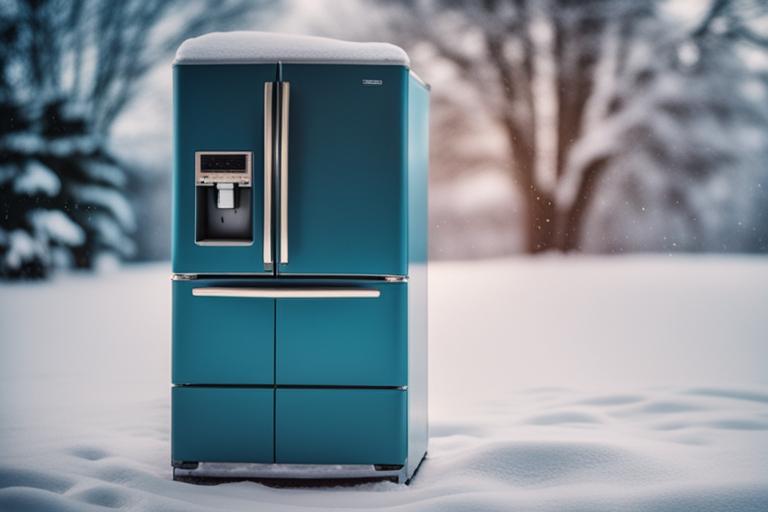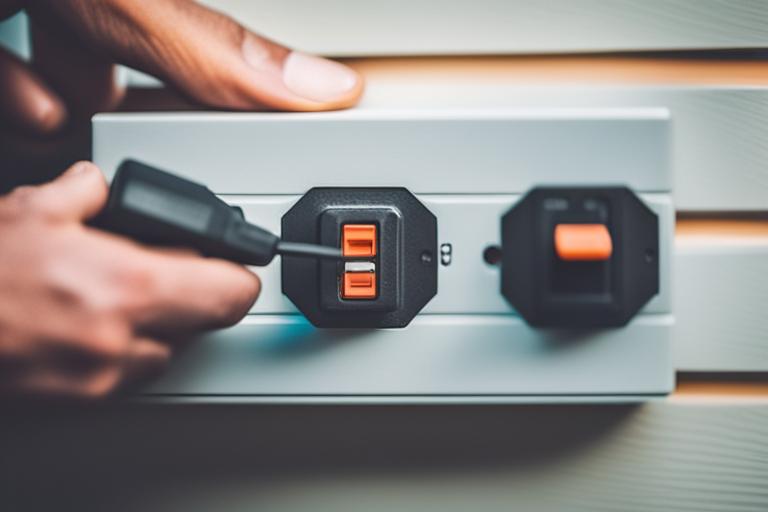Are you wondering if it’s safe to keep a refrigerator outside? The answer is that it can be safe, but there are several factors to consider before doing so. In this article, we will discuss the important considerations to ensure the safety and proper functioning of your outdoor refrigerator.
Outdoor Refrigerator Safety: What to Consider and How to Protect It
- Optimal temperature, humidity, sunlight exposure, rain, snow, and wind for refrigerator operation outside
- Electrical safety, protection from environmental factors, and regular maintenance to ensure safety when installing a refrigerator outside
- Benefits and drawbacks of having a refrigerator outside, including more storage space, convenience for outdoor entertaining, and energy efficiency, as well as risks of damage, theft, vandalism, and higher energy bills

Factors to Consider Before Placing a Refrigerator Outside
Temperature
The ideal temperature range for refrigerator operation is between 35°F and 38°F. Temperatures outside of this range can affect the refrigerator’s performance and increase energy consumption. To maintain optimal temperature control, consider purchasing a refrigerator specifically designed for outdoor use, or install a thermostat to monitor and regulate the temperature.
Humidity
The ideal humidity level for refrigerator operation is between 30% and 50%. High humidity can cause condensation to form on the refrigerator’s exterior, while low humidity can cause the refrigerator’s seals to dry out and crack. To control humidity, consider installing a dehumidifier or placing silica gel packets inside the refrigerator to absorb excess moisture.
Sunlight Exposure
Direct sunlight exposure can cause the refrigerator’s exterior to fade and crack and the compressor to overheat. To protect the refrigerator from sunlight exposure, place it in a shaded area or install a cover or shelter to block sunlight.
Rain and Snow
Water damage can cause the refrigerator to malfunction and pose a safety hazard. To keep the refrigerator dry when outside, install a breathable cover or shelter, and ensure that the cover does not trap moisture inside.
Wind
Strong winds can cause the refrigerator to topple over and suffer damage. To protect the refrigerator from strong winds, anchor it to the ground or purchase a refrigerator specifically designed for outdoor use with wind-resistant features.
| Factor | Safety Precaution |
|---|---|
| Electrical Safety | Ensure that the electrical outlet is suitable for the refrigerator’s power requirements and the electrical wiring is properly grounded. Use a heavy-duty extension cord designed for outdoor use if necessary. |
| Protection from Environmental Factors | Install a breathable cover or shelter to prevent moisture buildup and ensure proper ventilation. |
| Regular Maintenance | Clean the coils and exterior of the refrigerator regularly to prevent dirt buildup and damage. |

Safety Precautions to Take When Installing a Refrigerator Outside
Electrical Safety
Before installing a refrigerator outside, ensure that the electrical outlet is suitable for the refrigerator’s power requirements, and the electrical wiring is properly grounded to prevent electrical shock. If necessary, use a heavy-duty extension cord designed for outdoor use.
Protection from Environmental Factors
To protect the refrigerator from environmental factors, install a breathable cover or shelter to prevent moisture buildup and ensure proper ventilation.
Regular Maintenance
Regular maintenance is crucial to prevent damage caused by environmental factors and ensure the refrigerator’s proper functioning. Clean the coils and exterior of the refrigerator regularly to prevent dirt buildup and damage.
Benefits of Having a Refrigerator Outside
More Storage Space
Outdoor refrigerators can provide additional storage space for food and drinks, freeing up space in the indoor refrigerator for other items.
Convenience for Outdoor Entertaining
Outdoor refrigerators can be convenient for outdoor entertaining, providing easy access to cold drinks and snacks without the need to constantly go indoors.
Energy Efficiency
Outdoor refrigerators can reduce the workload of the indoor refrigerator, leading to lower energy bills and greater energy efficiency.
Drawbacks of Having a Refrigerator Outside
Risk of Damage due to Environmental Factors
Outdoor refrigerators are at risk of damage due to environmental factors such as extreme temperatures, humidity, wind, and water damage.
Risk of Theft or Vandalism
Outdoor refrigerators are at risk of theft or vandalism, especially if left unsecured. To prevent theft or vandalism, consider installing a lock or alarm system.
Higher Energy Bills if Not Installed Properly
Improper installation can lead to higher energy bills due to the refrigerator’s increased workload and energy consumption. To ensure proper installation, consult a professional or refer to the manufacturer’s instructions.
Case Study: John’s Outdoor Refrigerator
John is an avid grill master who loves to entertain guests in his backyard. He decided to install a refrigerator outside to store his drinks and food, rather than having to go back and forth to his indoor refrigerator. He carefully considered the factors mentioned in this article, including temperature, humidity, sunlight exposure, rain and snow, and wind.
John chose a location for the refrigerator that was shaded from direct sunlight and protected from strong winds. He also installed a breathable cover to protect the refrigerator from rain and snow. He made sure to properly ground the electrical outlet and used a heavy-duty extension cord, as the refrigerator was located further away from the house.
John regularly maintains his outdoor refrigerator, cleaning the coils and exterior to prevent damage. He enjoys the convenience of having an outdoor refrigerator for his outdoor entertaining, and he also noticed a reduction in workload for his indoor refrigerator.
However, John did experience a drawback of having an outdoor refrigerator when someone attempted to steal it. Luckily, his security cameras caught the culprit in the act, and he was able to secure the refrigerator with better locks and added security measures.
Overall, John believes that the benefits of having an outdoor refrigerator outweigh the drawbacks, and he recommends taking the necessary precautions to ensure its safety and longevity.
Conclusion
Keeping a refrigerator outside can be safe and convenient if the appropriate factors and safety precautions are considered. Ensure that you take the necessary steps to protect the refrigerator from environmental factors and ensure proper installation and maintenance. Consider purchasing a refrigerator specifically designed for outdoor use to ensure optimal performance and safety. With these recommendations in mind, you can enjoy the benefits of having a refrigerator outside without any safety concerns.
Questions and Answers
Who can install a refrigerator outside?
You can hire a licensed professional to install it.
What type of refrigerators can be used outside?
Outdoor-rated refrigerators are specifically designed for outside use.
How do I protect my outdoor refrigerator from the elements?
Use a weather-resistant cover or install it under a roof or awning.
What are the benefits of having a refrigerator outside?
It saves indoor space and provides convenience for outdoor entertaining.
How does an outdoor refrigerator affect my energy bill?
Outdoor refrigerators are energy-efficient and have a low impact on energy bills.
What if I live in an area with extreme temperatures?
Look for outdoor refrigerators with an extended temperature range to ensure safe operation.
Follow us!!